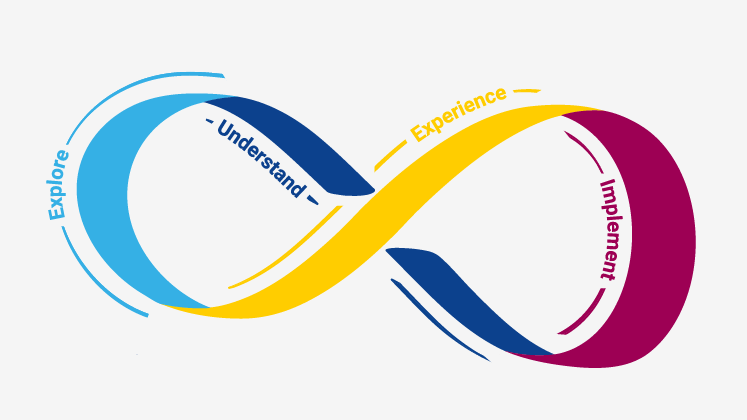Are you wondering what’s out there, do you know exactly which career is calling to you, or are you starting to change your mind about a previous plan? Whatever your future career path, taking advantage of opportunities at LSE can help you develop skills, gain valuable experience, build your personal brand and make an impact.
University is the perfect time to explore your interests and begin building a network of contacts. We're strengthening our existing careers support to empower you with more experiences, from opportunities in non-corporate work environments, to short-term 'micro-internships' as well as longer placements. This page will help you unleash your ambition by thinking about the skills and experiences that will help you take the next step.
Navigating your career journey
No matter where you are on your career journey, LSE Careers can help you take the next step towards defining your goals and making them a reality. The Career Development Cycle helps you understand which stage you're at in your career journey - exploring what's out there, understanding your values and goals, building your skills and experience, or securing a role. It's not a linear process, and throughout your journey you'll find yourself returning to different stages as your interests, skills and motivations change.
Find out more about navigating your career journey

How can you continue gaining experience while at LSE?
- Explore the events, coaching and resources available via LSE Careers, including opportunities to learn from alumni and connect with employers.
- As an LSE student or alum, you have access to a range of careers subscriptions which you can continue to use for up to five years after you graduate, from interview practice, to global opportunities, to alternative funding.
- Search jobs and opportunities with Career Hub, our vacancy board.
- Favourite the Careers blog for the latest career-related news and insights.
- Gain experience and learn new skills through a volunteering opportunity.
Read an alumna's experience...
I remember I used to (and still do) feel stressed over not knowing quite how to join the "real world". I knew I had some skills; I knew I had some intelligence. How do I let others know about me?
Read about Shuxiu Zhang's (International Relations, LSE, PhD 2013, now Head of EU Negotiations, HM Treasury, in the UK Civil Service) experiences of leaving academia and moving into and onward for the New Zealand and UK Governments.
Get into the habit of logging what you’re doing well, the achievements you’re proud of, and any feedback you receive. Then when you come to talk about your successes, for example in an interview or networking event, you have a list ready to go. Pick the strongest and most relevant, and tell the story using a structure such as STARR – Situation, Task, Activity, Result and Reflection. You can find more tips and support on the LSE Careers website.
Being willing to say ‘yes’ and get involved with activities like volunteering, LSESU societies, student voice opportunities, being a peer supporter or mentor, attending LSE events and taking part in competitions or projects can help you meet new people, build your skills and increase your confidence. Sometimes our best-laid plans are thrown off, and sometimes we’re inspired to take an entirely different path. Keeping your approach clear, open and optimistic can help you negotiate career blockers, should they arise.
Even after you graduate, keep developing your lifelong-learner mentality. When you overcome a challenge, come across a good idea, achieve a goal or see a problem solved in a different way, turn the experience into a tool to help you develop. Make a point of writing down what you learned and your initial reaction. Why was it important? Who taught you this lesson? Does it change how you would do things going forward? If so, how would you apply it? Give an example if you can.
Resilience is often misinterpreted as having a stoic attitude and ‘just getting on with it’ without complaint when things get tough. In reality, resilience is about your ability to ‘bounce back’, and it’s a skill you can develop over time. We’ll all face disappointment or failure at some point, and it’s okay to feel upset. Create your own ‘toolbox’ of methods to help you gain perspective. Useful starting points would be resources from LSE LIFE, Student Wellbeing, and signing up to our undergraduate mental health workshops.
Keep your finger on the pulse of the latest challenges, disruptions and innovations in your industry or sector, and on relevant world news, and try using it to inform your career strategy – from where you apply to how you answer interview questions. You can also apply this skill within our organisation. Practicing horizon-scanning can help you spot opportunities and anticipate problems before they arise.
Want to boost your skills? Explore the LSE LIFE Moodle resources and workshop timetable!